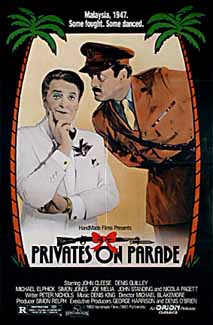Critical
The Monthly Film Bulletin wrote: "Nichols' satire, which is punctuated as it was on the stage by well executed musical parodies from the war years, is unabashedly old world. ... The film's blimpish, damn-fool Company Commander (John Cleese in over-familiar guise), and its sense of rollicking good fun (the boys shin over Terri's veranda balustrade for a fling at Raffles Hotel), lack a contemporary edge. ... Blakemore's adaptation does, beneath the farcical goings-on, have a ring of authenticity. It is much more than Dad's Army and It Ain't Half Hot, Mum ; less TV sitcom than Every Man in His Humor ." [11]
Boxoffice wrote: "One must really appreciate British humor in order to enjoy this black comedy that pokes fun at the unsettling topic of war. There are moments of hilarity, but they are sparse and by no means as powerful as the brief, tear-jerking melodrama that comes near the end. ... The film has some funny moments, the best of which are take offs on show-biz greats such as Fred and Ginger, the Andrews Sisters and Carmen Miranda. There's a nice snatch of '40s-style editing as the show goes on the jungle road. The movie is a combination of La Cage Aux Folles , M*A*S*H and Monty Python, though the combination is not nearly as successful as any of the separate elements." [12]
Variety wrote: "Apparently, one is expected to laugh at this old world view of homosexuality while also working up sympathy for those partaking of it, especially when the alternative is straightlaced traditionalist John Cleese. Unfortunately, all the characters remain nothing but caricatures, so one is totally unprepared for the abrupt turn ensuing from an attack on all these drag queens by insurgent communists. Unless precisely the right tone has been established, comedy and death make for an uneasy mix, and director Michael Blakemore (who staged the original Royal Shakespeare Co production of the piece) hasn't created an acceptable balance in which the picture's disparate elements can reasonably coexist." [13]
Marjorie Bilbow wrote in Screen International: "Peter Nichols's special talent for making us laugh till we cry real tears is seen here at its most guileful; the human tragedies of loneliness are concealed behind the high camp badinage, and the physical sufferings of war are presented as the pratfalls in a knockabout farce. ... Denis Quilley, superb as Captain Terri, gives a performance of faultless observation with every shrug and self-mocking pout precisely right as part of the defence mechanism of homosexual theatricals before it was legally O.K. to be gay. John Cleese, in spite of the Pythonesque echoes of his funny-walking Major, never lets the caricature take over wholly from the well meaning innocent. Michael Blakemore, making his film debut as a director, opens up the action not more than plot credibility makes essential and wisely concerns himself more with the camera's ability to capture the intimacies and subtleties of unspoken thoughts which are too easily lost in a live theatre." [14]
Derek Winnert wrote that "there are some good jokes and songs, but Privates on Parade is sometimes a bit dodgy and dated, and the lurch into serious drama at the end works no better on film than it did on stage". [15]
In the New York Times Vincent Canby described the film as "fine, witty, extremely self-assured [and] something seldom seen in movies-a melodramatic farce that comes complete with songs, dances, lewd jokes, sudden death, teary sentiment and smashing performances". [16]
CGIII.com stated that Privates on Parade was "better suited to the theatre". [17]
Michael Palin saw the film at the cinema and recorded his impressions in his diary:
The concert party numbers are well done and, as they were at the core of the stage success, are performed with panache and attractive skill by Denis Quilley and S Jones and others. Cleese and Michael Elphick are impressive at first, but gradually the film is dragged down. Relationships are hinted at, briefly consummated, then dropped just as they might have been getting interesting and Cleesey becomes saddled with the unenviable task of providing comedy as a palliative for all the floundering ‘serious’ realities of war at the end. He ends up with a desperate silly walk in the closing credits — as if finally confirming that the film is supposed to be a comedy, despite the balls being shot off, etc, etc. [18]
John Cleese later observed, "I think the trouble was that every single person working on it didn't really know anything about film. We're talking about Peter Nichols, Michael Blakemore, who is a great director and writer, and myself — I don't think any one of the three of us really knew what we were doing vis-a-vis film. An important learning experience — a shame, because it was a great stage play." [8]
Jim Clark, who edited, wrote "As a film, it didn’t really quite work. As a stage production it had been stylised and worked well. Denis Quilley was wonderful in both the play and the film but in the play he’d been the lead and because of John Cleese, Quilley’s part suffered. I also think that Denis O’Brien was disturbed by the homosexuality of Quilley’s character." [19]
